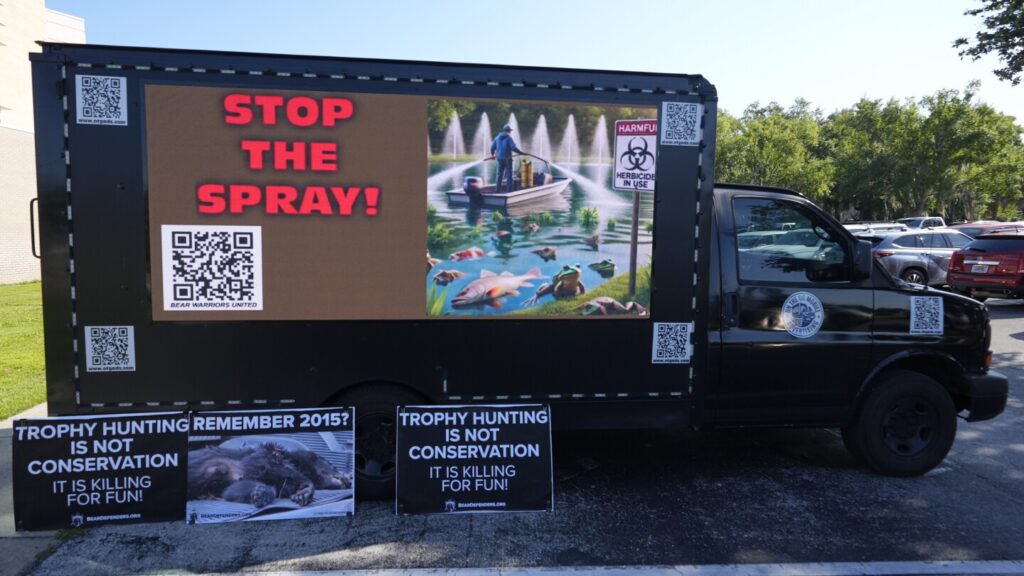ST. PETERSBURG, Fla. (AP) — Ten years ago, Florida held a black bear hunt that resulted in more than 300 animals killed in just two days before it was halted early. It was controversial from the start and hasn’t happened since — until possibly later this year amid strong opposition once again.
The Florida Fish and Wildlife Conservation Commission met Wednesday in Ocala to consider a bear hunt for December and annually into the future, possibly allowing the use of up to six dogs to corner the bears. Methods could include bowhunting, similar to rules for hunting deer, and bear hunting in baited areas.
The commission staff says the goal is to “begin managing population growth” for bears, which number about 4,000 in Florida. “Managing population growth is important to balance species numbers with suitable habitat and maintain a healthy population,” the staff report says.
Marion County Sheriff Billy Woods, whose fast-growing county hosted the meeting, said his office has received 107 calls about bear encounters with humans over the past nine months — likely only a fraction of actual encounters because many rural residents don’t report them. Woods said he supports the hunt.
“It needs to be regulated and it should be regulated. I think we keep not only our citizens safe but the state of Florida’s citizens safe,” Woods told the commission.
Several hunters and representatives of outdoors groups urged the commission to approve the hunt, noting Florida is one of only six states with significant black bear populations that does not allow it.
“Bear is a game species. It’s time for us to have some level of bear hunt,” said Travis Thompson, executive director at the All Florida conservation organization.
Hunt opponents contend there isn’t enough scientific evidence to justify killing bears and that the most reasonable approach is to convince people in Florida’s ever-sprawling developments to secure garbage and take other non-lethal steps to limit human-bear conflicts.
“I implore you to not allow the slaughter of these majestic animals we have in Florida,” said Leslie Carlile, an opponent whose family goes back several generations in Florida. “Trophy hunting is pure evil in my opinion.”
The FWC has received more than 13,000 online comments about the proposal, about three-quarters of them opposed. At Wednesday’s meeting, 170 people signed up to speak on both sides of the issue.
Hunt opponent Janet Osborne told the commission it would “take a step backward” by approving the bear proposal.
“The problem is the overpopulation of people,” she said.
A final decision on whether to hold the bear hunt is expected in August.
Among other things, supporters of the hunt point to a black bear’s extremely rare, fatal attack earlier this month on 89-year-old Robert Markel and his dog in a rural part of Collier County, in southwest Florida. Bears are also frequently seen in neighborhoods that stretch into their habitat, one even wandering onto Disney World’s Magic Kingdom in 2023.
In the 2015 hunt, hunting permits were for anyone who could pay for them, leading to a chaotic event that was shut down days early. The 300-plus bears killed then included at least 38 females with cubs, meaning the little bears probably died too.
This time, the plan is to have a random, limited drawing of permits with a limit of 187. Hunters could kill only one bear each and only in certain parts of Florida where the bear population is large enough. There would be no killing of cubs and none of females with cubs, according to the FWC staff.
A permit would cost $100 for a Florida resident and $300 for a nonresident.
For 2025, the plan is to hold the hunt from Dec. 6 to Dec. 28. In the future, the FWC foresees a bear hunt between Oct. 1 and Dec. 31, subject to more studies about the effect of hunting and the population of the animals.
Private landowners with 5,000 acres (2,023 hectares) or more could hold what the FWC calls a “bear harvest program” on their property under the proposal. Bears could be hunted at bait feeding stations on private property.
Read the full article here


